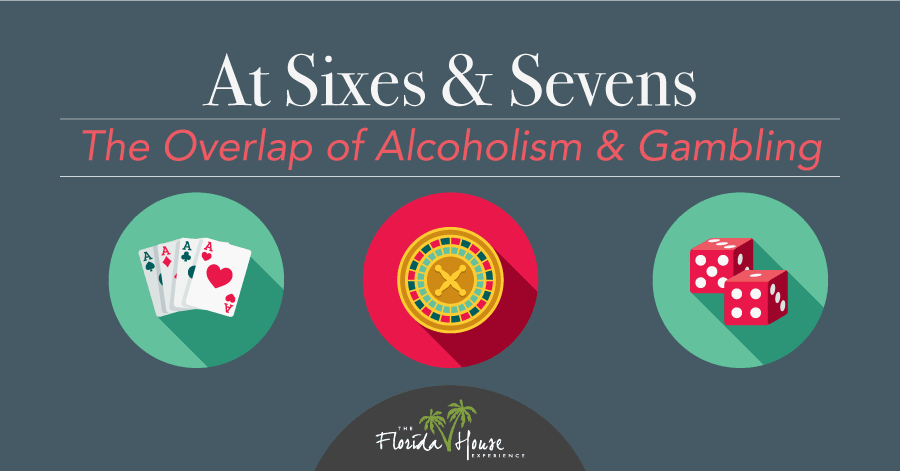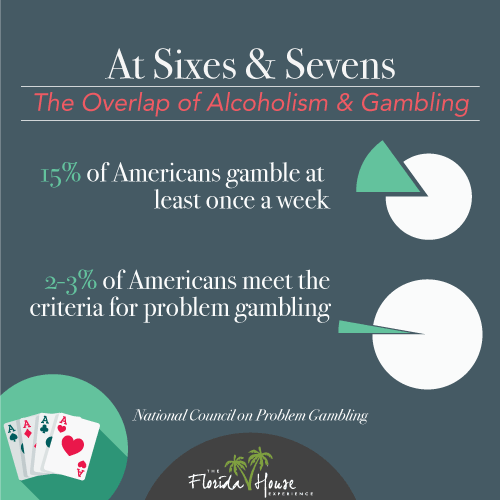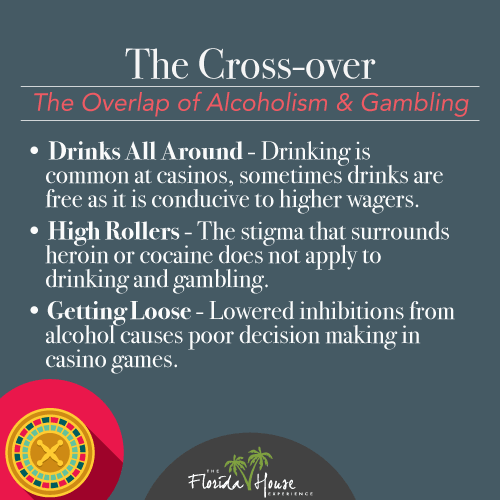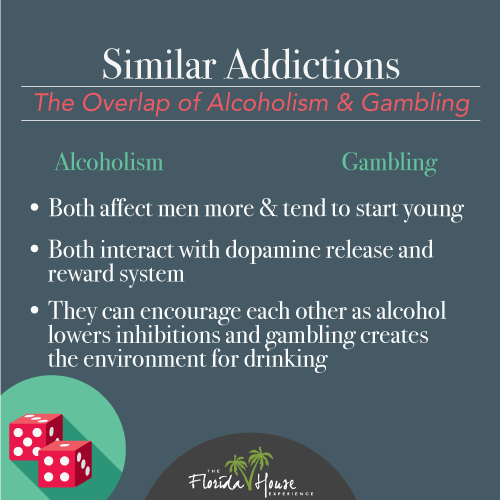
One of the issues that makes addiction more complex than some other chronic diseases is the potential for addiction to more than one substance or behavior at one time or for two addictions to play off of each other in dangerous ways. Such connections are common with addictions to gambling and alcohol.
These addictions are intertwined in a number of ways and can fuel each other, making each one more dangerous and difficult to treat.
Here, we discuss each addiction, talk about why they commonly occur together, and why formal addiction treatment is the preferred solution for successful recovery from either or both conditions.
Alcohol Use Disorder
According to the National Institute on Alcohol Abuse and Alcoholism (NIAAA), 15.1 million Americans had an alcohol use disorder in 2015. Alcohol use disorder (AUD) is a term used to encompass problem drinking — alcoholism and dependence.
Alcohol use disorders manifest in compulsive drinking and the inability to quit. Here are some signs that a person has a drinking problem:
- They are drunk, hungover or sick most of the time.
- They lie, cheat and steal to support their addiction.
- They have financial issues from spending their income on alcohol.
Gambling Addiction
 According to the National Council on Problem Gambling (NCPG), 15 percent of Americans gamble at least once a week. In this age of technology, gambling can take many forms, from playing online slots or sports games for money to betting on live sports results to playing table games or slots at casinos. As more and more opportunities arise in society to make bets, the number of regular gamblers is likely to increase.
According to the National Council on Problem Gambling (NCPG), 15 percent of Americans gamble at least once a week. In this age of technology, gambling can take many forms, from playing online slots or sports games for money to betting on live sports results to playing table games or slots at casinos. As more and more opportunities arise in society to make bets, the number of regular gamblers is likely to increase.
According to the same NCPG report, the council claims that 2-3 percent of Americans meet the criteria for problem gambling. People with a gambling disorder can’t stop themselves from playing these games because it becomes an uncontrollable compulsion. Often, gambling addicts continue playing until all their money is gone and only stop when they can no longer afford to keep going.
The Connection Between Drinking and Gambling
There are a few reasons why drinking and gambling are often talked about in the same breath:
- Drinking occurs commonly at casinos. At casinos, whether players are playing slot machines, table games or card games, drinking is encouraged. Some casinos even give out free alcoholic beverages at tables where the betting limit is high, encouraging gamblers to continue making larger wagers.
- American culture glorifies both activities. You don’t see people talking about heroin or cocaine users in a positive light the same way you do with people who can drink a lot. And to see how our society props up gambling, you need only take a trip to Las Vegas or Atlantic City. There is often a heroic aura around heavy drinking and gambling, making it easier for these habits to take over a person’s life.
- Drinking lowers people’s inhibitions. Heavy drinking causes people to make destructive decisions. In the most extreme cases, this could involve cheating on a spouse or deciding to use a more dangerous substance, but it commonly results in making the decision to take more risks. Most cities have casinos, so it’s logical to consider that people go out for a night of drinking and end up making risky decisions at a casino.
How Often Do Alcoholism/SUDs and Gambling Addiction Connect?
 A report compiled by the NorthStar Problem Gambling Alliance starts out with an anecdote that illustrates how gambling and drinking are inexorably intertwined. A man who has recently completed rehab for his alcoholism goes out to a casino in Las Vegas and almost immediately starts drinking again.
A report compiled by the NorthStar Problem Gambling Alliance starts out with an anecdote that illustrates how gambling and drinking are inexorably intertwined. A man who has recently completed rehab for his alcoholism goes out to a casino in Las Vegas and almost immediately starts drinking again.
Another story from The Basis, published by the Cambridge Health Alliance and Harvard Med School Teaching Hospital, describes a recovering alcoholic who discovers gambling later in life. Due to the similarities between gambling and drinking, gambling takes over his life in the same way his alcoholism had in the past.
When returning to the relationship between the two, it’s not difficult to see why these situations are common. Here’s a list of the common scenarios where connections manifest:
- A recovering addict has a relapse because of triggers present in the same environment as gambling.
- A recovering addict becomes addicted to gambling as a replacement for their substance use disorder (SUD).
- A person has a gambling addiction and an SUD simultaneously.
The NorthStar Alliance report mentions the prevalence of the last example: Experts estimate that the number of problem gamblers in recovery for an SUD could be between 35 and 63 percent.
Similarities Between Gambling Addiction and Alcoholism
 There are a number of similarities between problem gambling and alcohol use disorders that may help explain why the two are so heavily intertwined.
There are a number of similarities between problem gambling and alcohol use disorders that may help explain why the two are so heavily intertwined.
How and When They Start
Gambling and alcohol use are two of the most common behaviors passed down from family members. Both gambling addictions and SUDs share a similar prevalence when first-degree relatives have those problems.
Alcoholism and gambling are also two problems that tend to start young, and more often in males. In the past, we analyzed gender’s role in problem gambling. Young men are highly susceptible to the influence of gambling, alcohol and other illicit substances.
How They Affect the Brain
Some drugs follow very specific neural pathways to produce their effects. For example, opioids target opioid receptors and benzodiazepines enhance GABA receptors. Alcohol and gambling, on the other hand, rewire the brain’s risk and reward systems by causing rapid release of dopamine, a chemical that produces pleasure.
In this sense, gambling addiction and alcoholism cause many of the same feelings in the people that experience them, which is why someone recovering from one can be more susceptible to the other.
The Bottom Line
Addiction treatment that doesn’t acknowledge a strong connection between alcoholism and gambling is doing patients a disservice. In treatment, patients have to learn to avoid certain activities because of their potential as triggers. As we’ve found, gambling and alcohol use can absolutely be triggers for each other.
If you or a loved one is dealing with problem gambling, a substance use disorder or both, contact FHE Health, and we’ll help you start your path to lasting recovery.






